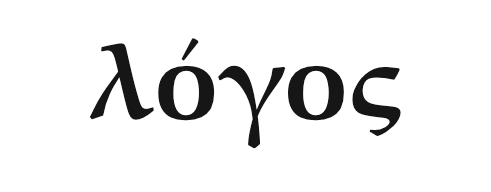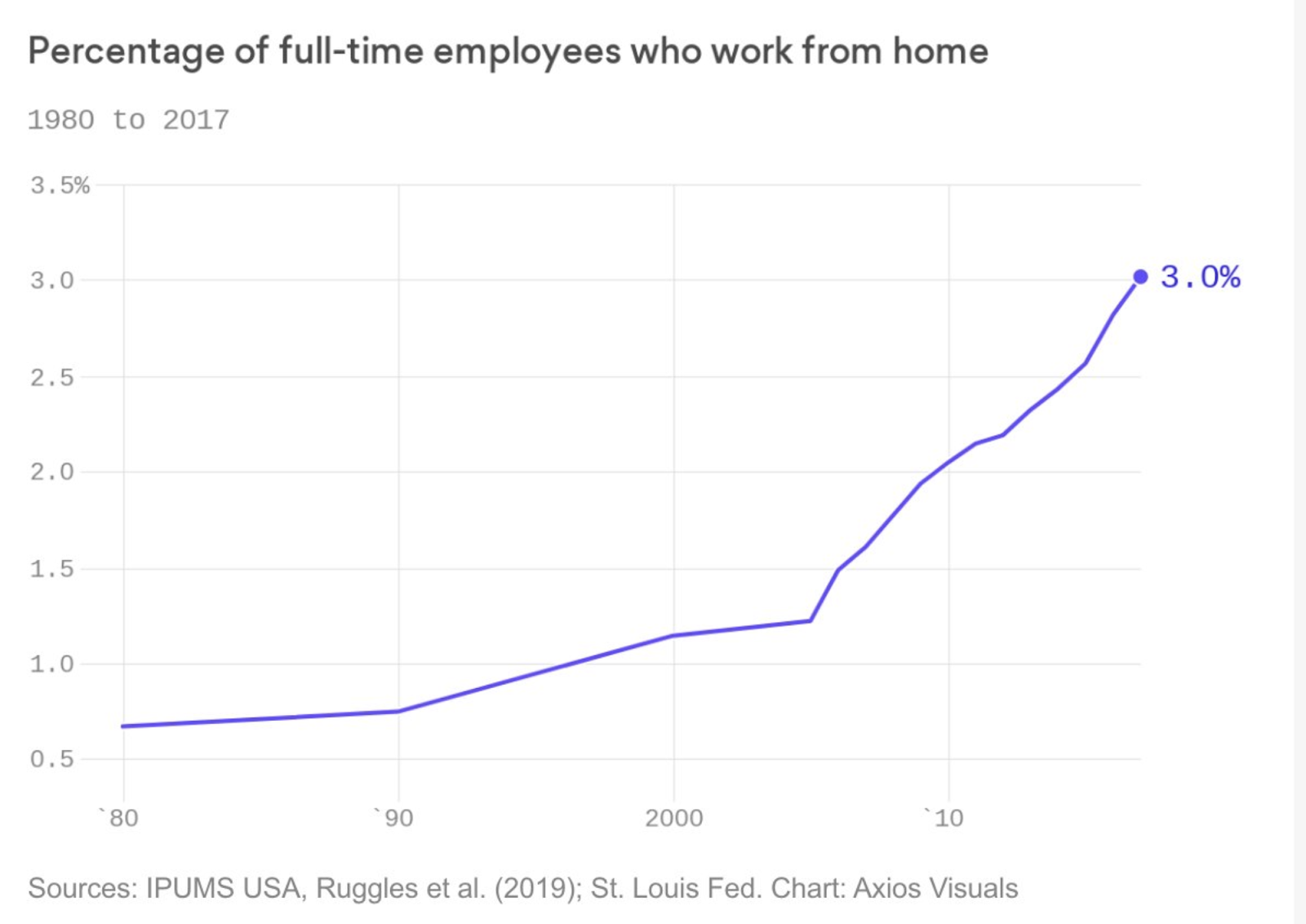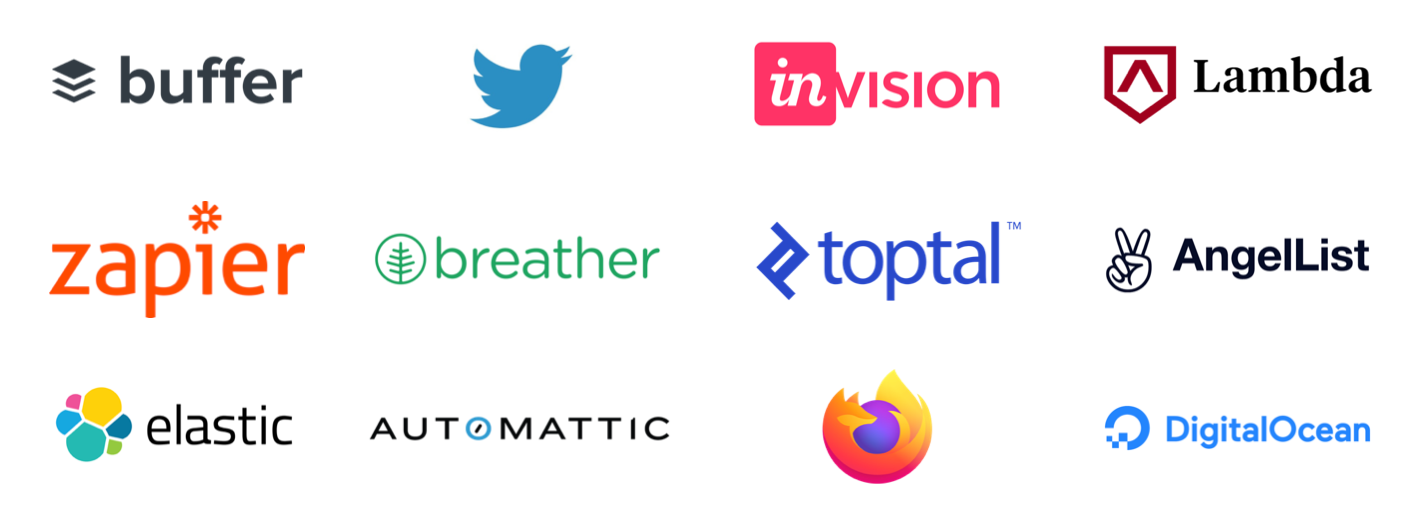Introducing the Logos Fund: A Rolling Fund Investing In Founders Building Startups Defining Remote Work Globally

I went from "remote work will happen over the next 10 years" to "it's already here, now what?" in under 6 months. To me, the shift was always inevitable but the timeline I could have never imagined happening this quickly. Remote work is here to stay.
Let me start by saying, there’s still a ton of things we don't know about the impacts of remote work on our work and our lives. That’s what makes me most excited, it reminds me of how I felt in 2009 when mobile happened and we were saying many of the same questions and statements that I hear today...
- Do you think you will be able to book hotels on a phone?
- There’s no way in the future people will work from just a mobile device!
- Can you imagine using a spreadsheet on a phone?
Pretty sure all of these came true + a million other things. To me, this is like the shift to mobile just bigger. It changes everything about how modern society is designed and that feels like one of the biggest opportunities in history to be a part of.
Introducing: The Logos Fund
We (myself and Chris Herd) are launching a Rolling Fund (anyone can join who is accredited) to invest in the best startups that will define how we work and live in the future. Click here if you want to invest in the fund.
Why is it named λόγος?
Logos is the Greek philosophy that "the word" is the most influential force in the world. We believe the written word is the core of building great global companies.
Why now?
The Modern Workplace is broken.

The way we work hasn’t changed since World War II. Everything about the way we work is broken for a knowledge based workforce vs a factory based workforce.
We tried to replicate the factory model into office work (see cubicles, executive suites, FIFO, etc. etc.), everything was synchronous in operation because it worked and to communicate you needed to be within close proximity. Then the internet happened. Now we travel to offices, working the same 9-5 schedule dictated by the industrial revolution, to operate on equipment designed to be used anywhere on the planet.
The internet opened up mobility, ubiquitous internet, and consumerized tech... Now everything is straining.
When you put tools under the lens of those 3 things, most fail.
Tools like Slack, Dropbox, Loom, etc. are shifting the game massively. It's not really about "remote work," it's about people working on their "own time."
Office work is a byproduct of the industrial revolution workday and has never been optimized for knowledge work. Operating to previous standards and constraints dilutes the quality of work operators can produce impacting overall productivity. Technology has advanced rapidly over the preceding 20 years while in the same time productivity has flatlined. This disconnect is resolved by adopting new working practices which are empowered by remote working.
Today, people live in suburbs or cities, optimized for a commute, leave their house at the same time, commute for two hours, sitting in a pollution emitting steel box, to attend a physical location, sit on a computer for 8 hours, in an open office that is a distraction factory, that makes it hard to focus, and costs the company a fortune. This makes absolutely no sense. The future of work does not look like the past. It requires a new playbook which requires new tools, infrastructure, and leadership.
When the workforce changes, the world changes.
What secret is the Logos Fund built on?
Trust *can be* built online faster than offline. We know that trust and relationships can be built remotely through the internet. Networks + reputation can be built and uncovered better and faster online than in person.
Most people in the world do not believe this to be true. Investing millions of dollars without meeting someone in person even 6 months ago seemed crazy. But why? Reputations are built online over years, it’s all searchable, and intros and networks all live online. The speed at which you can vet people and do business will be an advantage that almost no one realizes until it is too late.
The market is also forcing this to happen:
- Rising cost of employees and the rise in contractors and outside talent. (Toptal, Squared Away, etc)
- Flexibility, especially in location, becoming the #1 ask of employees.
- Massive distribution pipes with Slack and Zoom already at scale
- Covid-19 and long-term office closure is accelerating or amplifying these trends. The amount of major companies who are cancelling their offices and going all-in on remote work is massive. REI, Flexport, Twitter, and more.
- 82% of companies will be more remote post covid.
- 99% of workers never want to work in an office full-time again.
- Americans might never go back to the office, and Twitter is leading the charge
- Adoption of software is happening bottoms up from tools that solve individual employee’s needs not top down (Does anyone willingly bring SAP into their toolset from the bottom? Nah. But, Slack takes hold in small pods of work, and scales up and forces the businesses hand). IBM were forced to transition after so many employees paid for the service via company credit cards.
According to Angellist, 29% of all the startups with roles posted on AngelList in August 2019 were hiring remote roles. That’s over 7600 startups hiring remote roles, more than 1500 of which are mostly or fully remote companies themselves. This has increased drastically since COVID.
In the end, if big companies do have offices, isn’t every large company kind of a remote company? The remote secrets of today will be the tools and solutions that every company uses tomorrow.
"If we were to start over I would have built Zoom fully remote.
It's too expensive in SF now." – @ericsyuan CEO of @zoom
“Number of Americans working from home full-time has nearly tripled over past 20 years, and trend is accelerating” - Hunter Walk, Homebrew VC

Automattic, the creators of Wordpress, is valued over $3B in their latest round and has always been 100% remote. Github was acquired for $7.5B from Microsoft and was one of the first pioneers in the last decade to go all-in on remote work. This was just the beginning. ****Twitter has just made a huge push to be a remote company at scale. InVision was just valued at $1.9B after their $115m Series F. There’s a lot more coming, here’s just a few...

The world has changed. The tools that power remote work will become the tools that power the enterprise and vice versa. Software is changing how everyone works. Read this great post a from LightSpeed about this trend.

Investments & Deal Flow
We already have 5 potential ****deals that we are looking at right now but can't disclose because of privacy.
Where will we source deals / why will founders take money from me?
We are founders, first and foremost. We help CEOs think about designing remote cultures and hiring top talent. We help make deals happen. We sell, help with product, promote, and spend time with founders when it gets hard.
@ShaneMac has been a huge one over the years 🙌🏻
— Trey Sisson (@treysisson) June 23, 2020
Previous ventures have been funded by the following people:
Dick Costolo (Former CEO Twitter), Logan Green (CEO Lyft), Kayvon Beykpour (CEO Periscope, Head Product Twitter), Eoghan McCabe (CEO Intercom), Dennis Phelps (General Partner IVP), Saad Khan, Marc Ecko, Andrew Warner, Slow Ventures, Dave Morin, Sam Shank (CEO Hotel Tonight), Galen Buckwalter (Founder eHarmony), Rudy Gadre (VP Facebook & Amazon), Chris Howard (Fuel Capital), Kent Goldman (Upside Partners), Lerer Hippeau, Meg Whitman (CEO eBay, HP), Michael Arrington, Sundeep Peechu (Felicis), M.G. Siegler, Ashton Kutcher, Naval Ravikant, Chase Jarvis, T.A. McCann, Des Traynor, and over 50 more leading investors.
Over the past decade, I've built an audience of over 50,000 people across my Twitter, podcast, and blog writing about company culture, leadership, and product. I started a dinner series and podcast called ask, which has led me to interview and build relationships with some of the most influential people in media and technology. This is one area where I will continue to invest time to create private experiences for people to build meaningful relationships. Check out ask here.
Chris started the largest community around remote work. We see the remote companies before anyone else. This has exploded to ~1,000 founder, investors, and leaders in the remote working space, emerging as a vibrant & thriving community resource for all things remote.
If you are a founder, we would love to chat with you. Please email us or send us a DM on Twitter: @shanemac / @chris_herd
If you want to invest in our Rolling Fund, it's dead simple and you can do that here: https://angel.co/v/back/logos-fund
Read our entire thesis and learn more about us here: https://www.notion.so/logosfund/The-Logos-Fund-5d0019c86b5f4e548e83b8df592f5608
Join the conversation on Twitter below:
6,500 companies — with 11m+ aggregate employees – signed up to our waitlist in the last 6 months
— Chris Herd (@chris_herd) October 22, 2020
The biggest opportunites this decade will be in the future of work and living space
Here’s why me and @ShaneMac are launching a rolling fund today
[ a thread ] 💻🏠🌍
🚨🚨BIG ANNOUNCEMENT🚨🚨
— Shane Mac (@ShaneMac) October 22, 2020
I’m launching a Rolling Fund with @chris_herd focused on the future of remote work and living. The Logos Fund.
We haven’t seen a shift this big since mobile and it’s already changing how we work and live. There’s no going back.
[ a thread ] 💻🌍🏠 pic.twitter.com/0xdzMiPZJm
